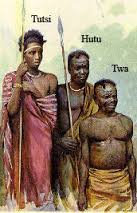1) In the case of the Gacaca courts, is it more or less effective to utilize a westernized judiciary system?
2)There is a claim that the Gacaca were an innovative attempt to mold western judiciary principles into Rwandan traditional methods of dispute resolution. Can it then be argued that if a region experiencing civil discourse adapts the Westernized judiciary system to be more culturally specific that the end result will be more concrete in terms of reconciliation?
3) Is “transitional justice” more effective in the long-run?
4) Were the Gacaca trials effective or did they simply harbor the political agenda of an authoritarian government?
5) By 1990, Rwandan prisons held more than 120,000 genocide suspects. The question is what is the role of the prison systems in the reconciliation process? Does imprisonment, arguably more than trials, help the reconciliation process?
6) Does a physical difference between people help or hinder reconciliation? Does a civil rights dispute have more concrete and positive reconciliation because we can physically see that two diverse groups are reconciling?
7) How can trials be accurate when the majority of the alleged “victims” are dead? Is it even possible to equally represent victims and the perpetrators in the Rwandan case?

